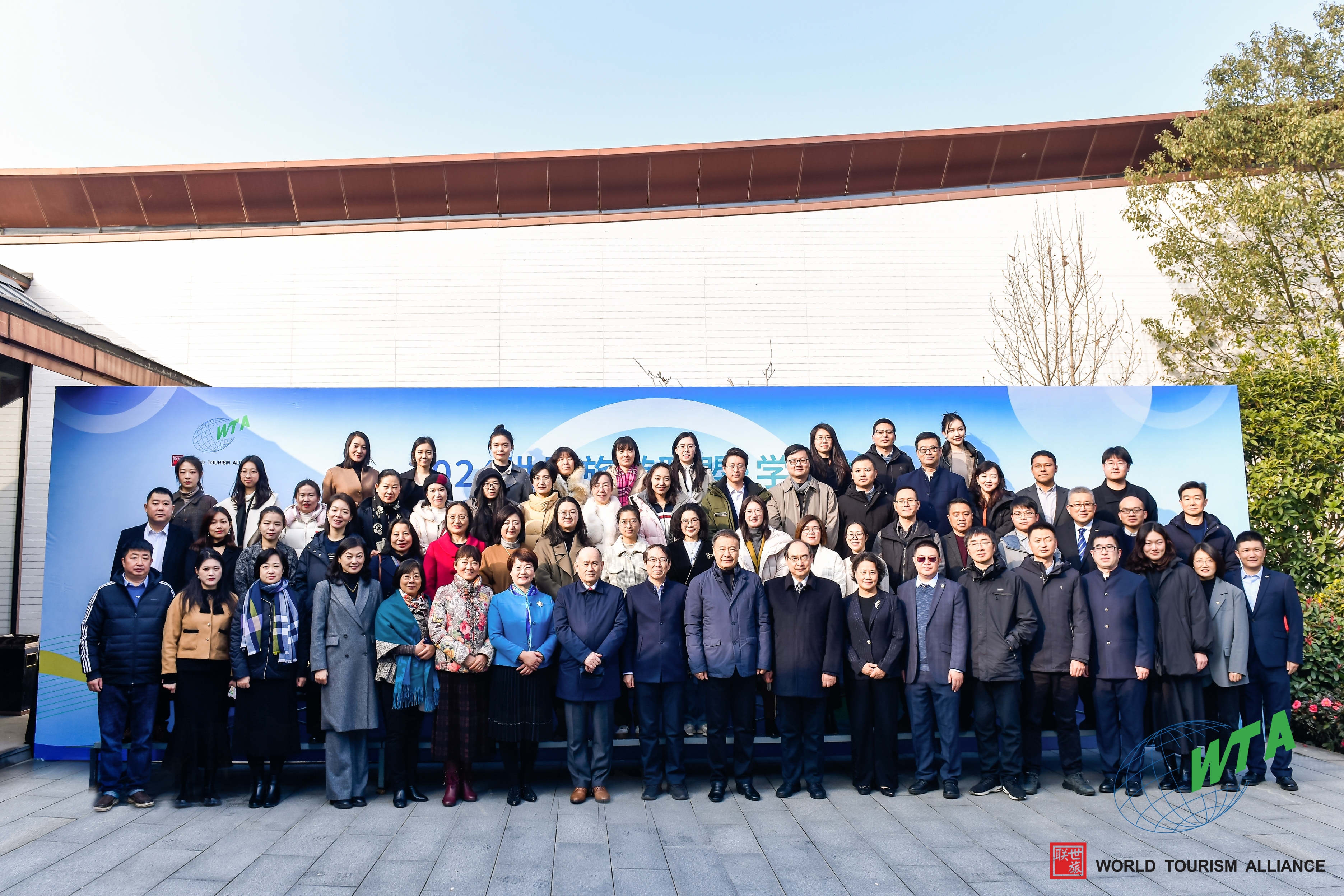2024.01.12
On January 11th, the World Tourism Alliance (WTA) hosted the “WTA • Scholars Dialogue 2024” at its headquarters, marking a significant gathering of academic minds and industry leaders. This event saw an impressive assembly of over 70 participants, including scholars from prominent universities such as the Hong Kong Polytechnic University (PolyU), City University of Macau, Zhejiang University, Sun Yat-sen University, Nankai University, and Minzu University of China, among others. Additionally, representatives from over ten institutions like China Tourism Education, Huazhong University of Science and Technology Press, Fliggy Travel, Sunriver Holding Group, and the WTA Secretariat graced the occasion. The dialogue was centered around the theme of “Deepening Exchanges, Promoting Dialogues, and Sharing Thoughts”. It featured keynotes speeches, thematic presentations, and a vibrant panel among young scholars. This initiative underscored the pivotal role of the WTA as a platform for enhancing collaboration and knowledge sharing between the WTA, academic community, and research institutions.
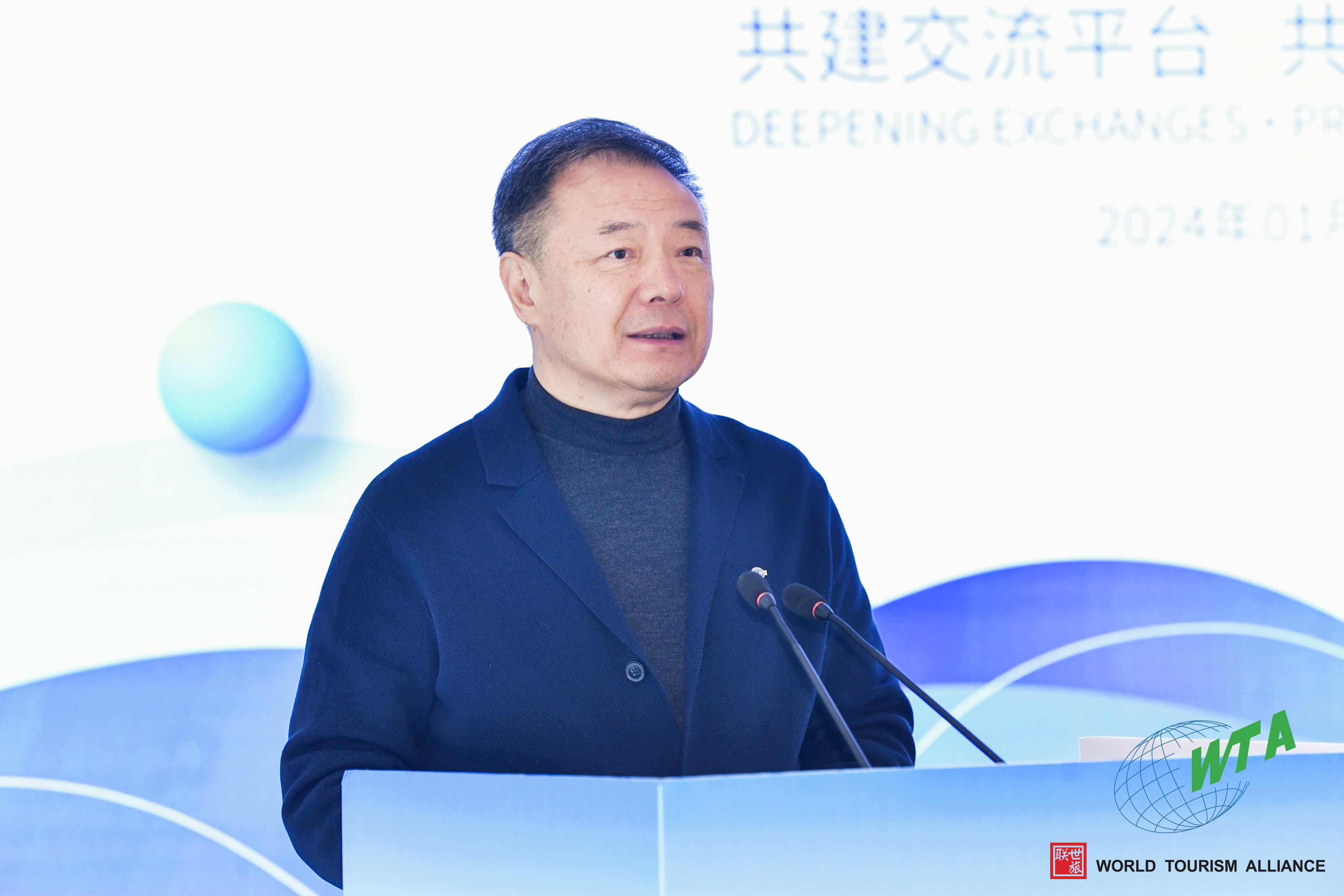
Mr. LIU Shijun, the Vice Chair and Secretary-General of the WTA, delivered an insightful address. In his speech, Mr. LIU emphasized the significant role of tourism as a medium that transcends national boundaries, cultures, and historical contexts. He pointed out that tourism has become an essential bridge connecting people worldwide and a critical force in driving global economic recovery, promoting regional peace, and enhancing cultural exchanges and mutual understanding among civilizations. He underscored the dialogue’s importance in integrating global tourism research with practical applications in China’s local context, contributing to the sustainable development of the tourism industry worldwide.
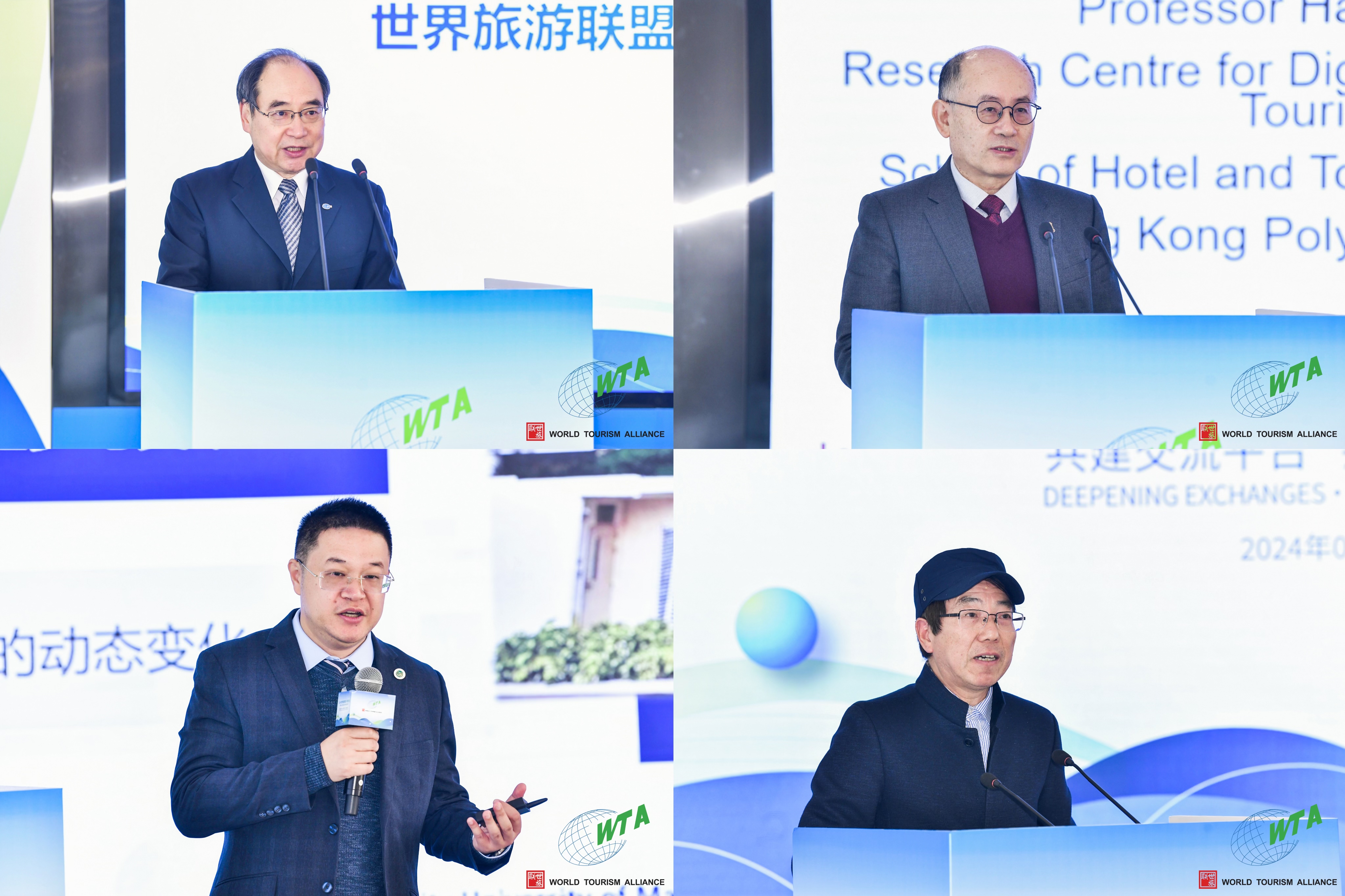 (Top Left)WANG Kunxin, Principal Researcher at the World Tourism Alliance Research
(Top Left)WANG Kunxin, Principal Researcher at the World Tourism Alliance Research
(Top Right)SONG Haiyan, Deputy Dean,Chair Professor, and Ph.D. Supervisor of the School of Hotel and Tourism Management at the Hong Kong Polytechnic University
(Bottom Left) LI Xi, Executive Associate Dean, Professor, and Ph.D. Supervisor of International Tourism and Management at the City University of Macau
(Bottom Right)ZHOUChunlin, Deputy Director of the National Tourism Vocational Education Teaching Guidance Committee of the Ministry of Education, and Professor at Nanjing Normal University
Professor WANG Kunxin, Principal Researcher at the World Tourism Alliance Research, chaired the dialogue and delivered a keynote speech. He presented an analysis of the WTA’s achievements in industry research, China Market Sentiment Study, poverty alleviation through tourism, rural revitalization, and shared prosperity. He emphasized the importance of leveraging the WTA as a platform for building an industry-academia-research consortia for joint research and shared development.
Professor SONG Haiyan, Deputy Dean of the School of Hotel and Tourism Management at the Hong Kong Polytechnic University, underscored the growing emphasis in higher education institutions on evaluating the societal, corporate, and industry impacts of academic research. In his presentation, Professor SONG analyzed the importance of cross-sector collaboration and the unique advantages that international organizations bring to such partnerships. He illustrated this point by citing specific examples of successful collaborations between research institutions and international organizations. Citing examples from Pacific Asia Travel Association (PATA) for its tourist forecasting, World Travel & Tourism Council (WTTC) on global retail tourism, and the Greater Bay Area tourism demand forecasting platform, Professor SONG shared insights on the fruitful collaboration between research institutions and international organizations.
Professor LI Xi, Executive Associate Dean of the Faculty of International Tourism and Management at the City University of Macau, presented insights on “Strategies and Pathways for Educational Collaboration between Universities and International Organizations”. He highlighted the crucial role of international organizations in global governance amid the backdrop of globalized educational resource allocation, continuous technological progress, and dynamic societal needs. Professor LI underscored the importance of international organizations in providing abundant educational resources and cultivating global competence, cross-cultural skills, and cultural intelligence in students.
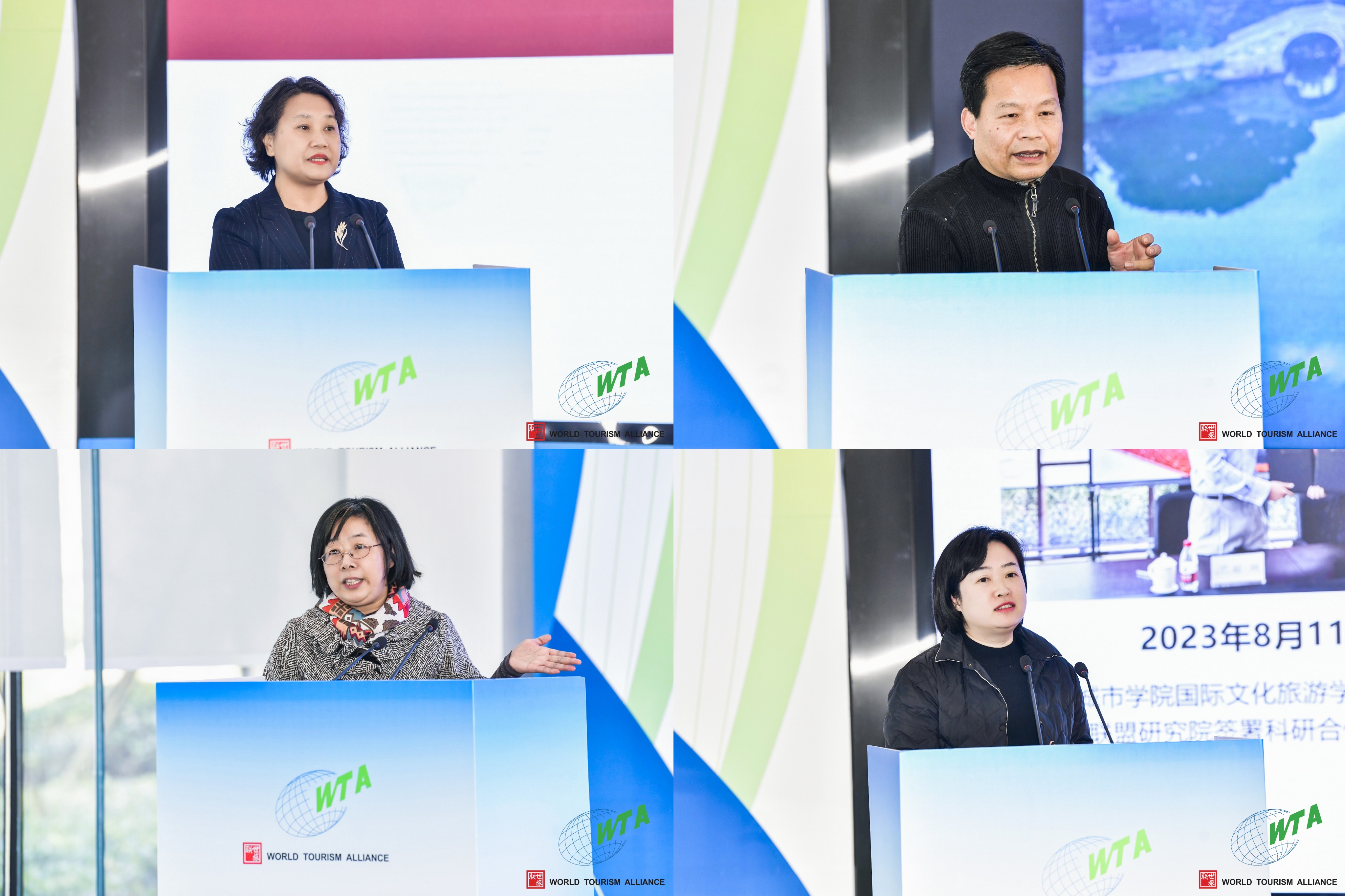 (Top Left)GU Huimin, Secretary-General of the China Tourism Education and Professor at Beijing International Studies University
(Top Left)GU Huimin, Secretary-General of the China Tourism Education and Professor at Beijing International Studies University
(Top Right)ZHOU Lingqiang, Professor and Ph.D. Supervisor of the Department of Tourism and Hotel Management, Zhejiang University School of Management; Academic Committee Member and Professor at Hangzhou City University
(Bottom Left) LI Yanqin, Professor and Ph.D. Supervisor of the School of Management at Minzu University of China
(Bottom Right)LYU Jiaying, Deputy Dean, Professor, and Ph.D. Supervisor of the International School of Cultural Tourism at Hangzhou City University
Professor XU Honggang, Dean of the School of Tourism Management at Sun Yat-sen University, and Associate Professor YANG Kun from Xizang Minzu University reported on the challenges and transformational development in higher tourism education. Professor GU Huimin, Secretary-General of the China Tourism Education and Professor at Beijing International Studies University, analyzed the inherent features, driving forces, and future trends of the gig economy in tourism under the backdrop of industrial transformation. Professor ZHOU Lingqiang from Hangzhou City University proposed a concept for developing international tourist resorts in China. Professor LI Yanqin from the School of Management at Minzu University of China categorized development models and examined the evolutionary path of spatial characteristics in China’s tourism-driven poverty alleviation efforts, using 90 cases published by the World Tourism Alliance. Professor YAO Yanbo, Deputy Dean of the College of Tourism and Service Management at Nankai University, discussed regional cooperation models, pathways, and experiences in river valley civilization tourism, based on the “Tourism Development Report on River Valley Civilization” released by the World Tourism Alliance. Professor LYU Jiaying, Deputy Dean of the International School of Cultural Tourism at Hangzhou City University, introduced the report “Tourism: A Driver for Shared Prosperity,” completed in collaboration between the World Tourism Alliance and the United Nations World Tourism Organization.
During panel for young scholars, participants including Professor KONG Haiyan, Director of the International Office of Shandong University (Weihai), Professor WANG Yajuan from the Research Office of Guilin Tourism University, Executive Vice Dean SONG Bo from the Tourism Research Institute of Shanghai Institute of Tourism, Associate Researcher HU Jian, Deputy Director at the Cooperation and Development Office of Tourism College of Zhejiang (TCZJ), and Associate Professor WANG Heng, Deputy Head of the Department of Tourism Management at Tourism College of Beijing Union University, shared their perspectives on various topics related to the cultivation of international scholars and internationalization of education, covering aspects like scientific research awareness, integration of industry and academia, localization, transformation of tourism research outcomes, sustainable growth of young researchers, and construction of academic discourse systems in the field.
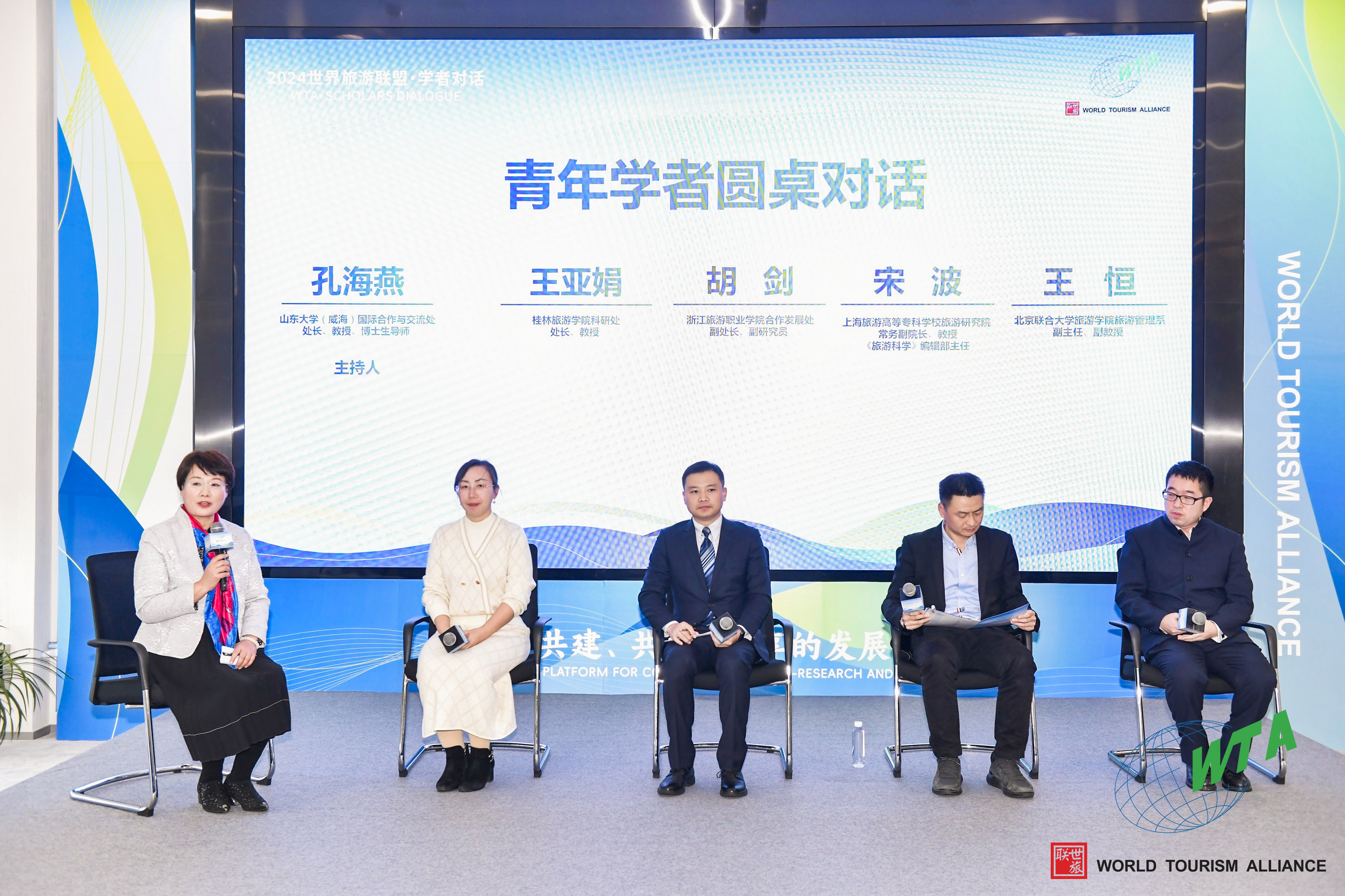
This Scholars Dialogue, hosted by the World Tourism Alliance, marked a first-of-its-kind academic exchange event specifically targeting professionals from universities, research institutions, and think tanks. It provided a vital platform for intellectual exchange among experts and scholars. This event played a pivotal role in drawing the attention of researchers both domestically and internationally towards the WTA, encouraging deeper engagement with its activities, studies, and promotion. Consequently, this initiative significantly amplified the academic productivity of the World Tourism Alliance, bolstered the cohesion of its platform, and enhanced its social influence.
